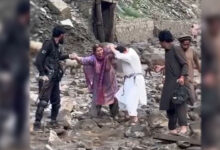“Immunization Save Lives”

By Shamsullah Durrani
World Immunization Week (WIW) 2022 is celebrated across the world in the last week of April. This year’s theme aims to highlight the collective action needed in communities to promote the use of vaccine to protect from different dangerous diseases. Vaccines are among the greatest advances in global health and development. According to UNICEF, for over two centuries, vaccines have safely reduced the scourge of diseases like polio, measles, smallpox etc.
Routine immunization is a set of vaccination, given to children from birth to the age of 15 months. Completing the schedule protects them from 12 vaccine-preventable diseases such as tuberculosis, polio, diphtheria, pertussis (whooping cough), tetanus, Haemophilus influenza type B, hepatitis B, diarrhea, pneumonia, typhoid, measles and the recently added rubella.
Balochistan province has the lowest immunization rate as compared to other provinces of Pakistan. This low immunization rate has been confirmed the health department of the government of Balochistan. In the province, the majority of parents are unable to vaccinate their children due to poverty, lack of information, and lack of basic health facilities. Moreover, people in rural Balochistan have to believe that the vaccination of children will lead to illnesses and disease.
Similarly, they have the perception that it is a conspiracy of the western countries and that vaccines are made of ‘haram’ animals and will be injected their blood.
BRSP with the financial support of UNICEF promoted routine immunization in 50 UCs (union councils) of 10 targeted districts including (Zhob, Duki, Kharan, Khuzdar, Killa Abdullah, Pishin, Quetta, Kech, Panjgur, and Lasbela) of Balochistan “. BRSP was able to vaccinate about 11,134 zero- dose and defaulter/refusal children in high-risk districts of Balochistan. This target was achieved with the support of CRPs (community resource persons) influencers, parents/caregivers and government EPI staff. Moreover, these interventions & contributions overall boosted the immunization coverage rate in the province, and also changed the perception of people towards intake of routine immunization course for their children.
BRSP supported the government EPI (Expanded programme immunization) and improved the routine immunization coverage rate in high risk districts. BRSP was able to remove the misconception and faulty beliefs of the rural communities through its organised communities and Community Resource Persons in all the hard to reach communities. BRSP also engaged the district health officers, religious leaders, teachers and community notables and local influencers to dispel the myths around immunization.
Additionally, During the Measles and Rubella campaign, BRSP reached to 81,920 caregivers of children (0-15 months) with key messages on maternal/child health, its benefits. In addition, 7973 children (0 dose and defaulters) have been referred and vaccinated under routine immunization campaign. Similarly, BRSP vaccinated 3,326 children for Measles and Rubella in six districts (Quetta, Killa Abdullah, Kalat, Bolan, Nushki and Mastung).






